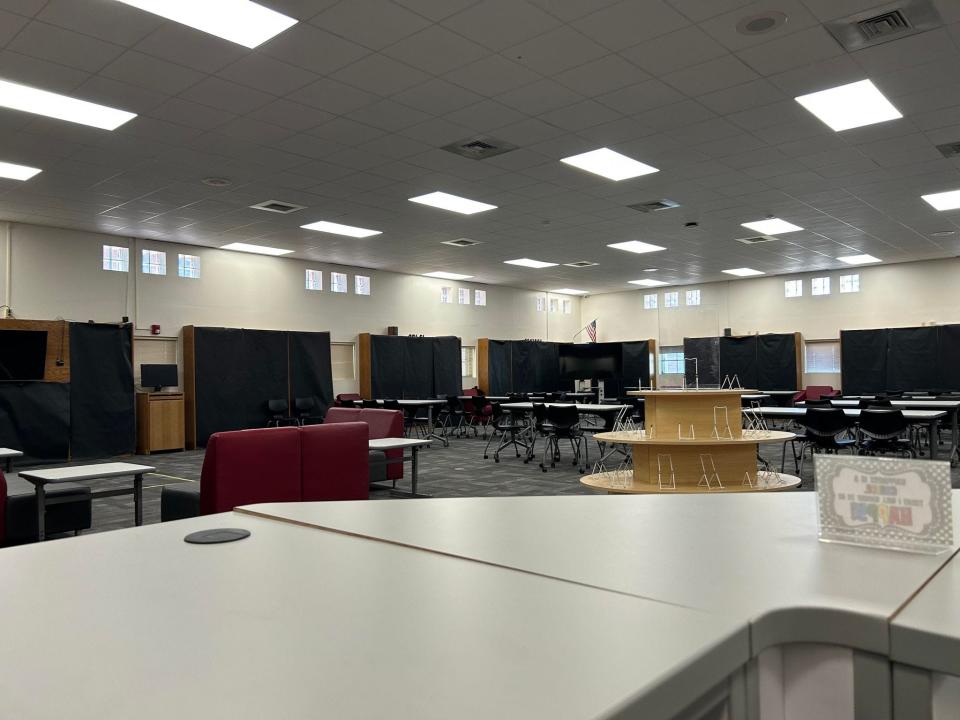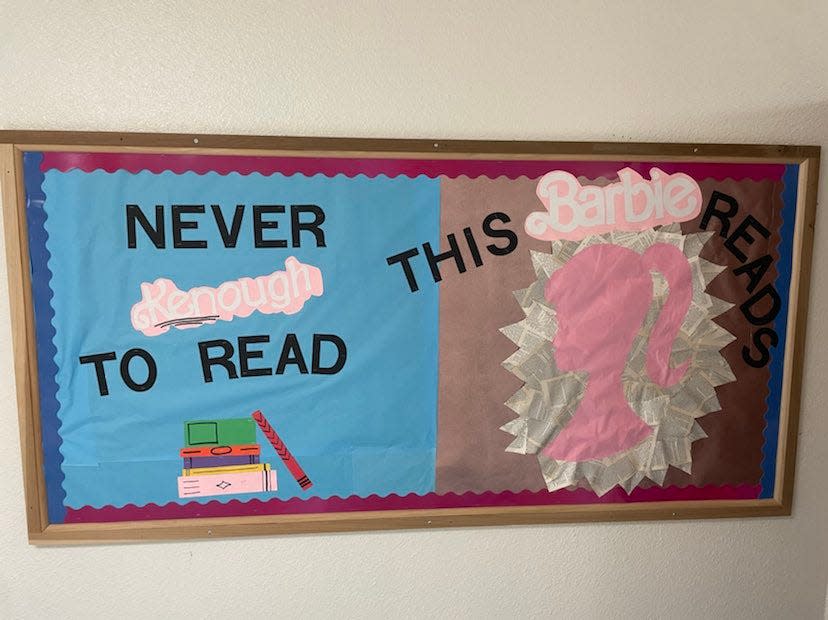Escambia students, parents frustrated by 'open' libraries with concealed books collections
Parents are speaking out against Escambia County Public Schools' unreviewed library books being hidden from the public eye, despite the district’s insistence that media centers would remain open this school year, even if collections are limited.
All of the district's library books are currently under review for sexual content in response to Florida HB 1069, a bill that took effect on July 1 and establishes statewide practices and policies surrounding the content of school library books.
Georgia Clarkson took to social media Thursday to share the photos that her son, a Pensacola High School senior, sent her of his school library during the school day. The post, which shows numerous book shelves covered over with black paper, sent Facebook into a frenzy and has been shared 748 times as of Friday afternoon.
Politics seep into Escambia Schools: Racism, gender identity and banned books. Escambia School Board entangled in crossfire.
Why every ECPS book is being reviewed: Escambia County schools reviewing every single library book for sexual content

“There are no books or book spines visible in the whole library, and then he (my son) took a picture today and sent it to me. I didn't anticipate that it was going to go viral, but I’m glad that it did,” Clarkson told the News Journal Thursday. “Now it seems like the district is intentionally disguising what is actually going on. When you trust the district to have responsibility for your students during the school week … you're a taxpayer, and they're just straight up masking what's actually happening — It's deeply unsettling.”
It was under the district media specialist’s guidance that schools with unreviewed books cover the shelves until they could be evaluated, according to ECPS spokesperson Cody Strother. For schools like Pensacola High School, the shelves of the “open" libraries were smothered with black paper. Reports of other Escambia County high schools, such as Escambia High School and Booker T. Washington High School, have indicated the same conditions.
“We are aware of social media posts reporting these conditions. While it may have a stark appearance, there is good reason to cover those titles,” Strother said in a statement. “In terms of protecting students from potentially objectionable or illegal content and in terms of protecting professionally those media center specialists from someone removing one of those titles, it makes sense to physically deny access to those titles not yet reviewed.”
Booker T. Washington junior Beatrice Bunnell, an officer in the National English Honor Society, said the school was even looking for National Honor Society students to assist them in covering the shelves.
The district told the News Journal Friday that all of the libraries have at least some titles approved to be checked out, but circulation has been delayed due to other beginning of the year-duties, such as orientations, schedule changes and textbook distribution. Once those are complete, all libraries will be open for students to check out books from.
Clarkson was not alone in feeling that she was getting mixed messages from the district, particularly after Superintendent Keith Leonard allegedly sent a call out to district parents specifically assuring media centers would be open.
“We have no say,” said Manda Young, an Escambia County mother with a freshman at Pensacola High School and a fourth grade student Global Learning Academy. “The government is telling us what our kids can ingest. It is no longer up to the parents ... this is what feels like the beginning of a fascist regime, because a lot of them start with banning books. So, I'm going to leave it at that."
Jill Sparks, the mother of two Escambia County Public School elementary school students, brought her concerns before the school board Tuesday night in response to a classroom library closed down inside of her child’s school.
A sign used to block access to the classroom library was addressed to "Grown Ups" and encouraged parents to send their children to school with books from home, or public libraries, so they have books to read throughout the school day since the classroom could not provide them.
Sparks said after she posted a photo of the closed classroom library online, the district released this statement attempting to reinforce the idea that students would be given access to approved books.
"As our media specialists review and clear titles, they are being made available for check-out. When this process is complete, the media specialists will begin reviewing teachers' classroom libraries. In the meantime, approved titles from the school media centers will be made available to teachers in their classrooms for student self-selection or leisure reading," the district reported in the statement.
Her skepticism in the situation was affirmed, as photos began surfacing of other “open” school libraries across the school district that were completely barren.
“I think in this political climate, when we're seeing this sort of thing happen all over the state and in other states, in groups like Moms for Liberty who are pushing really hard to remove books — any inch is scary,” Sparks told the News Journal. “So, what's next? They are not going to just come in and close everything down all of a sudden. They're going to slowly and surely take away those things.
“The school board in particular either doesn't know what's going on, or isn't being truthful with us,” Sparks added.
Changing times: Proud purple to angry red: These Florida residents feel unwelcome in 'new' Florida
As far as Escambia High School and Booker T. Washington High School, which have also been called into question for hiding the unreviewed books in their school libraries, Strother said that as of Friday, the media centers are open with titles that are cleared and available for students. But it is going to take time to achieve a full collection. In the meantime, the unreviewed books must be concealed to protect students and ECPS staff. However, the district does not feel this will be a major inconvenience.
“Context is important,” Strother wrote. “Oftentimes, at the high school level, Media Center Specialists are deeply involved with the distribution of textbooks, teacher and student technology, and other materials. Because of this, it is normal for media centers to have very few, if any check-outs at the beginning of the school year.”
The larger high school media center collections take longer than the younger levels to complete, which is why the elementary schools seem to have fuller selections at the start of the school year.
“This was not unexpected, so we would ask for students, parents, and members of the public to remain patient with our hard-working Media Center personnel, as they meticulously undertake this Herculean task, one that is mandated by state statute,” Strother wrote.
What about the books being challenged by citizens?
Once all school media centers and classroom libraries are evaluated and returned to shelves, the school district will once again be looking at the list of over 200 books challenged by citizens.
Booker T. Washington Junior Beatrice Bunnell said that banned book conversation has even seeped into her National English Honor Society's bulletin board that she came to school early to help design.
Bunnell said the club had the idea of tying in the district's banned books as a way to send a message of promoting literacy. Her club came up with several variations that were all rejected.
“Our first idea was to make Barbie read The Handmaid's Tale, or to have a stack of books with titles including those of banned books. We were told that neither of these ideas would be possible, so we instead (suggested) a stack of books – with no titles – with the word “banned” scrolled across them in red sharpie. This idea was also not possible,” Bunnell said. “Our bulletin board – meant to promote literacy in our school – was not allowed to have a single book title on it or make mention of the book bannings.”
Ultimately, they were forced to resort to something far less thought-provoking.

Bunnell said this is not the fault of administrators or club sponsors – but of Florida laws.
“As students, these laws are silencing our voices and oppressing our abilities to learn. As a student, I hope to see immediate change in these laws and how they are carried out. No learning environment should be void of literature,” Bunnell said.
For Young, her daughter is far more likely to enjoy reading independently than a class-mandated novel. When she was inspired to read "The Perks of Being a Wallflower" last year as an eighth grader after seeing the movie, the book led to positive conversations between her and her daughter.
The two later learned it would be the first book to be banned from Escambia County Public School libraries.
“What it did was just led to a healthy conversation about certain topics that were discussed in the book, and honestly left us both wondering why that should not be allowed in the library,” Young said.
Find the full list of the 223 current book challenges in Escambia County Public Schools here.
This article originally appeared on Pensacola News Journal: Escambia school book ban controversy impacts Pensacola High library

